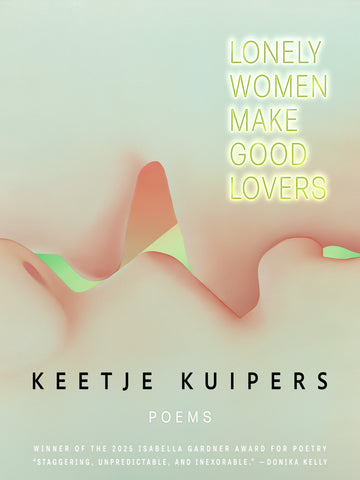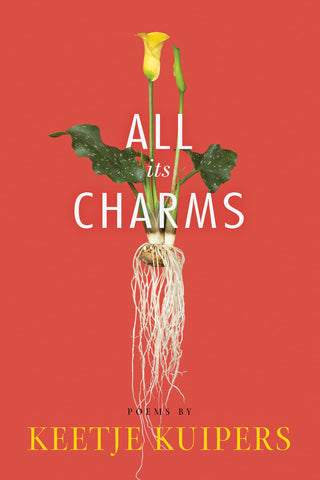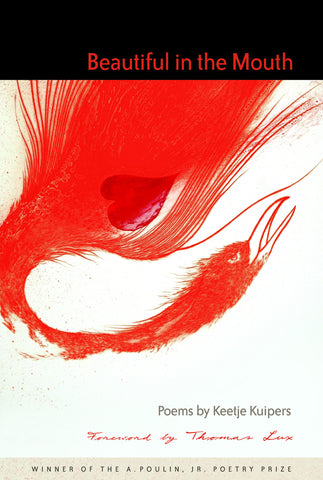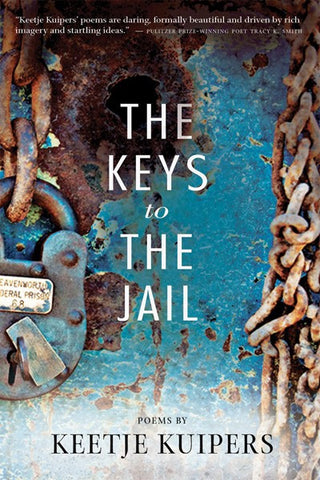
About This Title
The daring and deeply sexy poems in Lonely Women Make Good Lovers are bold with the embodied, earthy, and startlingly sensual.
These unforgettable love poems—queer, complicated, and almost always compromised—engage a poetics of humility, leaning into the painful tendernesses of unbridgeable distance. As Kuipers writes, love is a question “defined not by what we / cannot know of the world but what we cannot know of ourselves.” These poems write into that intricate webbing between us, holding space for an “I” that is permeable, that can be touched and changed by those we make our lives with.
In this book, astonishingly intimate poems of marriage collide with the fetishization of freedom and the terror of desire. At times valiant and at others self-excoriating, they are flush with the hard-won knowledge of the difficulties and joys of living in relation.
Eating Sea Urchin
For the moment, speech is paused.
In the silence of the restaurant, we consider
the orange flesh, sagittal as a stilled
tongue, before placing it on our own.
Like most forms of magic, I’ve always believed
in words. For instance, the time you told me
it was over. Not that what you’d said
was true, but that by saying it everything instantly
was changed. To change where you are,
you might press your tongue’s wet muscle
to a word round and glowing as the button
of an elevator and arrive a moment later
in a place unforeseen. Or use it to undo
your shirt one iridescent disc of a word
at a time until, tongue slipping delicately
in and out the stitching, you transform
into something that no longer has a skin.
But the tongue is not a blade: the blade
is the pain that opens the mouth and finds
the soft, forgiving muscle inside. Uni,
like any word resisted long enough, is salt
turned finally sweet on the tongue. It’s alright
to say this is not the life you want for yourself
even one moment longer. This is how we each
might finally become different people—
with the gentle, wincing crack of a knife.
Praise for Lonely Women Make Good Lovers
"Kuipers’s wickedly erotic and ingenious fourth collection (after All Its Charms) explores identity and how the body is invested with meaning that is continuously shifting. Among other topics, these poems address coming to terms with one’s evolving sexuality (notably in 'The Magician’s Woodpile,' which depicts the speaker setting fire to a pile of penises), the adrenaline of new romance, and the steady simmer of attraction to a long-term partner. Kuipers expertly mixes frank expressions of sexual desire with the domestic, subverting common preconceptions and breaking arbitrary boundaries surrounding the body. 'In the Outdoor Shower with My Pregnant Wife' is a rapturous ode not only to a woman’s pregnant body but to the ways in which it is permanently altered by pregnancy: 'I want already/ the body scarred by stretch marks, the extra flap/ of skin to hang soft at her waist, the feet/ that will never again be quite so small.' Kuipers is exceptional at setting the scene with a carefully chosen detail, as in 'The Wound,' which begins, 'It was the winter the dog swallowed// a sewing needle.' This wide-ranging collection tackles love in its varied forms with originality and hard-won wisdom. (Apr.)" — ![]() Publishers Weekly, starred review
Publishers Weekly, starred review
“The poems are elegant, earthy, and pertinent. Kuipers moves language marvelously, and I love her understatedness, making lyrics of what could be ‘politicized’ texts, which are all the more persuasive for the transformation.” —Marilyn Hacker, National Book Award and PEN/Voelcker Award-winner
“How does romantic love bring us together—or isolate, or confound? What if there's a baby on the way? What if we come to each other naked as birds in flight, as stripped logs, as old photographs, as pure ideas? What does a grown-up, clear, thoughtful, emotionally available, gifted lesbian poet get when— decades after Adrienne Rich—she comes up, still wearing her tanks, and takes her mask off, after the proverbial wreck, and makes ‘a pact with the world,’ with her wife, with their earth and air? This poet is your poet. Here are your poems.” —Stephanie Burt, author of We Are Mermaids and Professor of English at Harvard University
“Keetje Kuipers’ Lonely Women Make Good Lovers is a staggering, unpredictable, and inexorable collection. Caught in the nexus of hunger and ruin, Kuipers’ speaker explores the atmosphere between what she knows or almost knows and what cannot be explained. Recognition of the self, of others, Kuipers shows us, is a practice. A compelling read, these poems are nimble and vulnerable, mapping a return to the self, a return to longing, a return to the archive of what the body remembers.” —Donika Kelly, Kate Tufts Discovery Award-winner and author of The Renunciations




